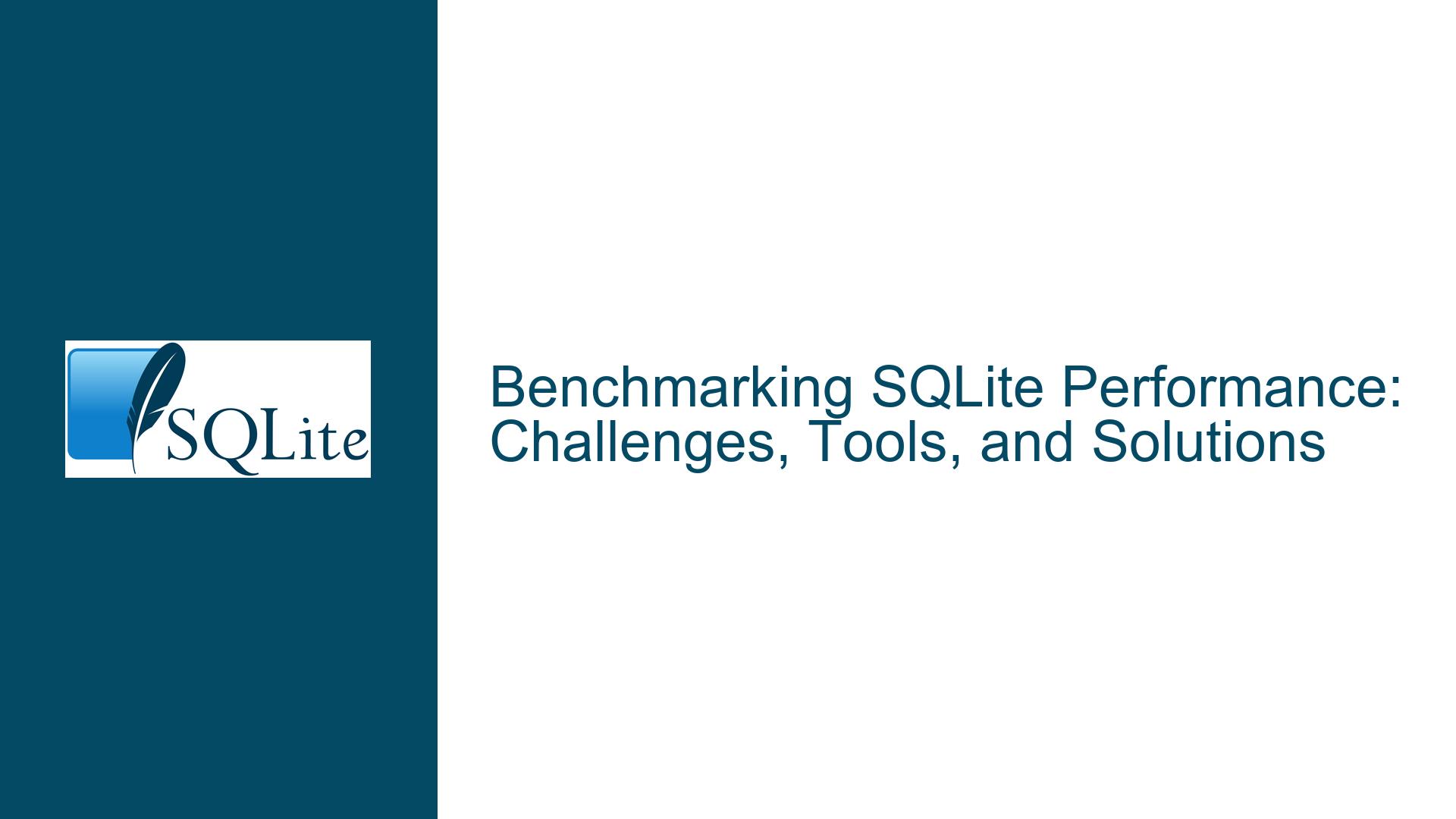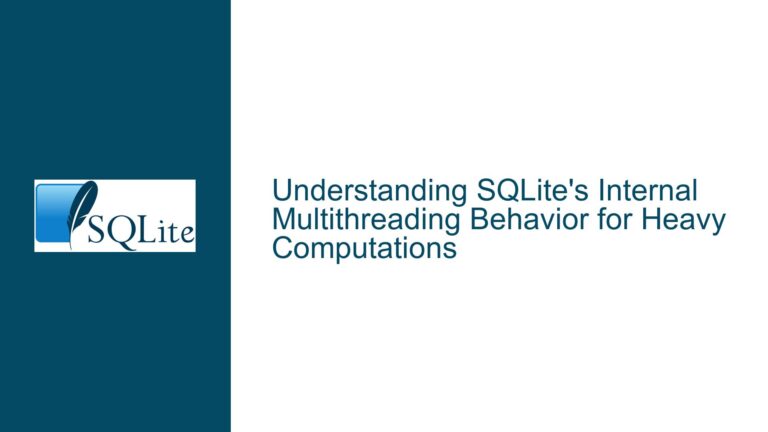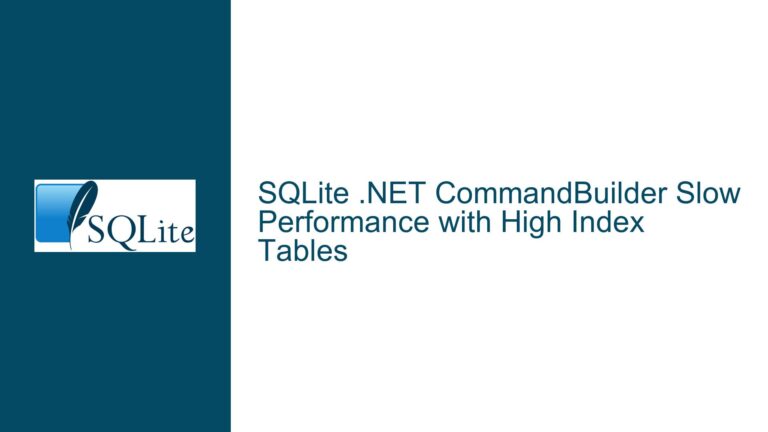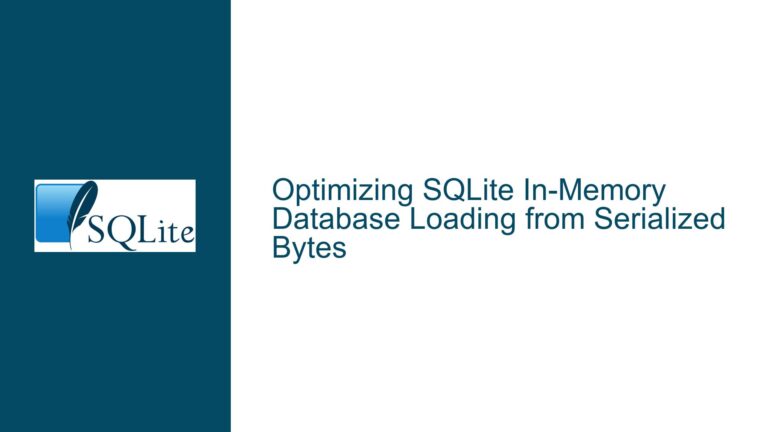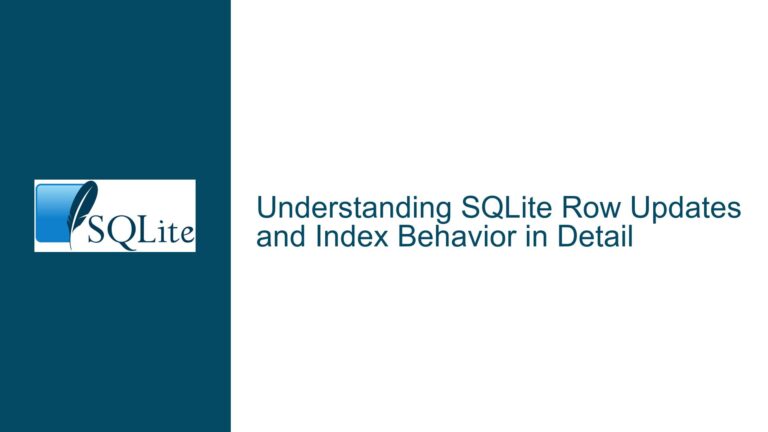Benchmarking SQLite Performance: Challenges, Tools, and Solutions
Inconsistent SQLite Benchmarking Results Across Versions and Configurations
Benchmarking SQLite performance is a critical task for developers and database administrators aiming to optimize their applications. However, achieving consistent and reliable benchmarking results is fraught with challenges. SQLite’s performance can vary significantly depending on the version, compile-time options, hardware configurations, and even the benchmarking tools used. This inconsistency often leads to misleading conclusions about whether a new SQLite version or configuration is truly faster or slower.
One of the primary issues is the lack of repeatability in benchmarking. Even when the same tests are run on the same hardware, subtle changes in the environment or configuration can lead to vastly different results. For example, upgrading the operating system or changing the disk type can inadvertently affect the benchmark outcomes. Additionally, SQLite offers a plethora of compile-time options, such as SQLITE_DEBUG, which can drastically alter performance. The paper "Dangers and Complexity of SQLite3 Benchmarking" highlights that changing just one parameter in SQLite can result in performance differences of up to 28X.
Another layer of complexity arises from the variety of benchmarking tools available within the SQLite source tree. With nine different tools named speed, each with its own tunable parameters, it becomes challenging to ensure that the same tests are being run consistently across different environments. This inconsistency makes it difficult to compare results between different users or even different runs by the same user.
Moreover, the hardware itself plays a significant role in benchmarking outcomes. A new software release might appear faster simply because it is running on upgraded hardware, rather than due to any inherent improvements in the software. This hardware dependency further complicates the task of determining whether a new SQLite version or configuration is genuinely faster.
To address these challenges, tools like LumoSQL 0.4 have been developed to provide a more controlled and consistent benchmarking environment. LumoSQL 0.4 assigns a SHA3 hash to each test run, along with identifying features, and stores the results in an SQLite database. This approach allows for more reliable comparisons between different runs and configurations. However, even with such tools, the complexity of SQLite benchmarking remains a significant hurdle.
Hardware Variability and Compile-Time Options Impacting SQLite Performance
The performance of SQLite is highly sensitive to both hardware variability and compile-time options. These factors can lead to significant fluctuations in benchmarking results, making it difficult to draw definitive conclusions about the performance of different SQLite versions or configurations.
Hardware variability is one of the most significant contributors to inconsistent benchmarking results. Even minor changes in hardware, such as upgrading the CPU, increasing RAM, or switching from an HDD to an SSD, can have a profound impact on SQLite’s performance. For example, an SSD might drastically reduce the time required for disk I/O operations, making a new SQLite version appear faster when, in reality, the improvement is due to the hardware upgrade. This hardware dependency makes it challenging to compare benchmarking results across different systems or even across different runs on the same system after a hardware upgrade.
Compile-time options further complicate the benchmarking process. SQLite offers a wide range of compile-time options that can significantly alter its behavior and performance. For instance, enabling SQLITE_DEBUG can slow down SQLite by a factor of three, as it introduces additional checks and logging that are not present in the production build. Other options, such as those related to memory allocation or threading, can also have a substantial impact on performance. The paper "Dangers and Complexity of SQLite3 Benchmarking" underscores this point, noting that changing just one parameter can result in performance differences of up to 28X.
The interaction between hardware and compile-time options adds another layer of complexity. For example, a compile-time option that optimizes SQLite for multi-core processors might show significant performance improvements on a modern multi-core CPU but could have little to no effect on an older single-core processor. Similarly, options that optimize for disk I/O might yield different results depending on whether the system uses an HDD or an SSD.
Given these complexities, it is crucial to carefully control both hardware and compile-time options when benchmarking SQLite. Tools like LumoSQL 0.4 aim to address these challenges by providing a more controlled environment for benchmarking. However, even with such tools, it is essential to be aware of the potential impact of hardware variability and compile-time options on benchmarking results.
Implementing LumoSQL 0.4 for Consistent SQLite Benchmarking
To address the challenges of inconsistent SQLite benchmarking, LumoSQL 0.4 offers a robust solution that provides a controlled and repeatable environment for measuring SQLite performance. By standardizing the benchmarking process and storing results in an SQLite database, LumoSQL 0.4 enables more reliable comparisons between different SQLite versions, configurations, and hardware setups.
LumoSQL 0.4 introduces a benchmarking tool that runs tests in a controlled manner, ensuring that each test is assigned a SHA3 hash along with identifying features. This approach allows for the consistent measurement of SQLite performance across different environments. The results of each test run are stored in an SQLite database, making it easy to compare results between different runs and configurations.
One of the key advantages of LumoSQL 0.4 is its ability to answer seemingly simple questions about SQLite performance in a consistent and repeatable manner. For example, it can determine whether SQLite gets faster with each version, which compile options make a given version of SQLite faster, and how different versions and compile options combine to change performance as data size increases. Additionally, LumoSQL 0.4 can provide insights into the impact of different storage backends, such as LMDB or Oracle’s BDB, on SQLite performance.
The LumoSQL 0.4 benchmarking tool also addresses the issue of hardware variability by allowing users to compare benchmarking results across different hardware setups. This capability is particularly useful for determining how SQLite performance scales with faster or slower disks, CPUs, and memory configurations. By standardizing the benchmarking process and storing results in a centralized database, LumoSQL 0.4 enables users to take advantage of thousands of CPU-hours from other users, providing a more comprehensive view of SQLite performance across different environments.
To get started with LumoSQL 0.4, users can follow the simple instructions provided in the LumoSQL README. The tool is designed to be easy to use, with a single command providing universal, repeatable, and definitive answers to a wide range of SQLite performance questions. Additionally, LumoSQL 0.4 is extensible, allowing users to add their own tests and contribute to the growing body of benchmarking data.
In conclusion, LumoSQL 0.4 offers a powerful solution to the challenges of inconsistent SQLite benchmarking. By providing a controlled and repeatable environment for measuring SQLite performance, LumoSQL 0.4 enables more reliable comparisons between different SQLite versions, configurations, and hardware setups. This tool is an invaluable resource for developers and database administrators looking to optimize SQLite performance in their applications.
